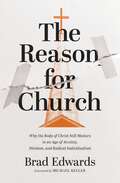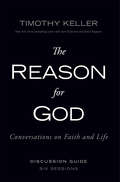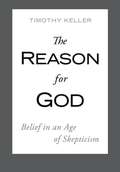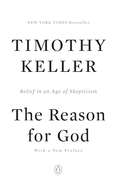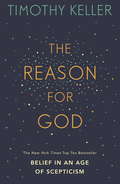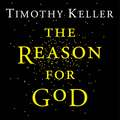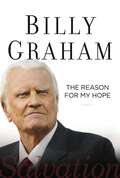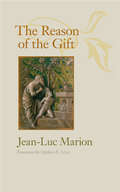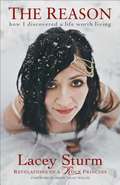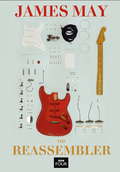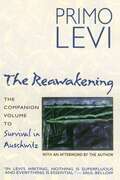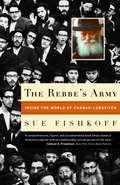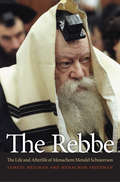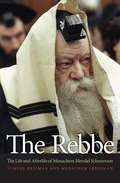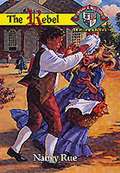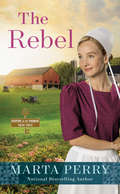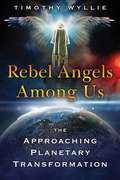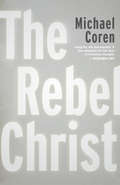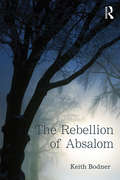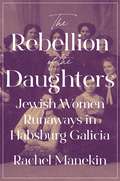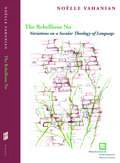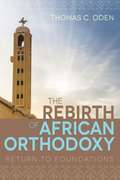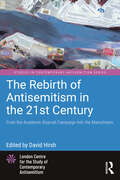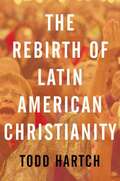- Table View
- List View
The Reason for Church: Why the Body of Christ Still Matters in an Age of Anxiety, Division, and Radical Individualism
by Brad EdwardsRediscover the goodness and beauty of the Body of Christ.The evangelical church is hemorrhaging. Over 40 million Americans have dechurched in the last 25 years alone, and multiple generations have been raised to believe the most spiritual thing they can do is follow God by following their heart--right out of the church. Yet, this shift is happening right as society is hitting record levels of loneliness, stress, and anxiety. In The Reason for Church, pastor Brad Edwards connects the dots of our current church crisis and provides compelling reasons to come back.In part 1, Edwards shows how individualistic beliefs make church implausible and compromise our spiritual formation:Marketplace logic and consumeristic approaches to discipleshipIntuitional spirituality and therapy speakSocial media's distortion of what is true, good, and beautifulPerformative politics and culture warsVirtuous victimhood, the decline of trust, and the rise of powerThese chapters show why individualism won't satisfy and can't provide the refuge it promises.In part 2, Edwards uses personal examples, church history, non-Western expressions of faith, and Scripture to show how the church is our existentially satisfying alternative to individualism. Equipped with an institutionally robust vision, we will rediscover the church as God's spiritual greenhouse where soul-tired sojourners and lonely exiles are restored and repurposed for life in the world.The Reason for Church offers an honest-yet-hopeful vision for church as a necessary institution. With radical individualism tearing us apart, we need compelling reasons to fall back in love with Christ's bride, now more than ever.
The Reason for God Discussion Guide: Conversations on Faith and Life
by Timothy KellerIn the New York Times bestselling book The Reason for God, Timothy Keller established himself as a modern-day C. S. Lewis who brings together faith and intellect, theology and popular culture, modern-day objections and historic Christian beliefs. Now fans of the book will find resources to help them engage with those same objections, drawing on recent scholarship and debates. The Reason for God video-based Bible study can be used individually, in groups, or by any believer who is engaging with friends who don’t share his or her beliefs. Christians will be challenged to wrestle with their friends and neighbors’ hardest questions, and to engage those questions in ways that will spark an honest, enriching, and humbling dialogue. The Reason for God video captures a live and unscripted conversation between Timothy Keller and six panelists discussing their objections to Christianity. This discussion guide will help small groups and individuals dig deeper into these objections and learn about both sides of the issues. Study Details: Session Titles and Descriptions: 1. Isn’t the Bible a Myth? 2. How Can You Say There Is Only One Way to God? 3. What Gives You the Right to Tell Me How to Live My Life? 4. Why Does God Allow Suffering? 5. Why Is the Church Responsible for So Much Injustice? 6. How Can God Be Full of Love and Wrath at the Same Time? Awards: 2011 Christian Retailers Choice award for Curriculum (Nontraditional) 2011 Outreach Magazine Resources of the Year for Small Group (Curricula)
The Reason for God: Belief in an Age of Skepticism
by Timothy KellerKeller explains how faith in a Christian God is a soundly rational belief, held by thoughtful people of intellectual integrity with a deep compassion for those who truly want to know the truth.
The Reason for God: Belief in an Age of Skepticism
by Timothy KellerA New York Times bestseller people can believe in—by "a pioneer of the new urban Christians" (Christianity Today) and the "C.S. Lewis for the 21st century" (Newsweek). Timothy Keller, the founding pastor of Redeemer Presbyterian Church in New York City, addresses the frequent doubts that skeptics, and even ardent believers, have about religion. Using literature, philosophy, real-life conversations, and potent reasoning, Keller explains how the belief in a Christian God is, in fact, a sound and rational one. To true believers he offers a solid platform on which to stand their ground against the backlash to religion created by the Age of Skepticism. And to skeptics, atheists, and agnostics, he provides a challenging argument for pursuing the reason for God.Look out for Timothy Keller's latest book, The Songs of Jesus. From the Trade Paperback edition.
The Reason for God: Belief in an age of scepticism
by Timothy KellerAs the pastor of an inner-city church in New York City, Timothy Keller has compiled a list of the most frequently voiced ‘doubts’ sceptics bring to his church, as well as the most important reasons for faith. In THE REASON FOR GOD, he addresses each doubt and explains each reason.Keller uses literature, philosophy, real-life conversations, and reasoning to explain how faith in a Christian God is a soundly rational belief, held by thoughtful people of intellectual integrity with a deep compassion for those who truly want to know the truth.
The Reason for God: Belief in an age of scepticism
by Timothy KellerAs the pastor of an inner-city church in New York City, Timothy Keller has compiled a list of the most frequently voiced 'doubts' sceptics bring to his church, as well as the most important reasons for faith. In THE REASON FOR GOD, he addresses each doubt and explains each reason. Keller uses literature, philosophy, real-life conversations, and reasoning to explain how faith in a Christian God is a soundly rational belief, held by thoughtful people of intellectual integrity with a deep compassion for those who truly want to know the truth.(P)2008 Penguin Audiobooks
The Reason for My Hope: Salvation
by Billy GrahamWhat is the most hopeful word in History? For Billy Graham, that word is SALVATION. Salvation from what? From our selfish and self-destructive selves. From the messes we get ourselves into. From the sin that has haunted humanity from the beginning of time and the evil that pulls us down every day. From the cultural deceits that blind us to God's saving message. From the Hell so many don't believe in. If we don't think we need salvation, we're fooling ourselves.If we think we are beyond salvation, we're underestimating God.If we just don't want to think about salvation, we're putting ourselves in eternal peril. At the age of ninety-five Billy Graham proclaims God's Gospel with resolve and deep compassion. It is a message he has been preaching for more than seventy years. And in this book you will sense its urgency, filled with hope for the future. "Believe on the Lord Jesus Christ, and you will be saved" (Acts 16:31) From America's evangelistic elder statesman: Salvation is what we all long for, when we are lost or in danger or have made a mess of our lives. And salvation belongs to us, when we reach out for the only One who can rescue us, Jesus. The saving message of the Gospel is the heartbeat of this preacher and evangelist. Millions around the world have heard Billy Graham proclaim this unchanging truth. He has never forgotten the transformation of his own life, when he first said yes to God's gift of salvation, and he has witnessed multitudes turn their hearts to the God of Hope. The Reason for My Hope: Salvation presents the essence of that transformative message. It is biblical and timeless, and though simple and direct, it is far from easy. There are hard words, prophetic words, directed toward a culture that denies the reality of sin and distracts us from the veracity of Hell. But through its ominous warnings shines a light that cannot be extinguished, a beacon of hope that Jesus came to seek and to save that which was lost. (Luke 19:10).
The Reason of the Gift (Richard Lectures)
by Jean-Luc Marion Stephen E. LewisThis book represents a continuation of Jean-Luc Marion's work on givenness as a foundational concept. A former student of Jacques Derrida, Marion is known for his work in seventeenth-century French philosophy, for his theory of "God without being," and for his reformulation of phenomenology. Marion's groundbreaking work on givenness is articulated through attentive readings in a striking array of philosophical texts. The four pieces collected here, based on the fall 2008 Richard Lectures at the University of Virginia, expand upon and go beyond the lines of Marion's previous work and exemplify the intersection of his own constructive brilliance with his talent and rigor as a historian of philosophy. Reengaging philosophers long central to Marion's own work (Husserl, Heidegger, Levinas) and highlighting the significance of lesser-known but decisive influences (Natorp, Rickert, Meinong), these lectures will be valuable to readers interested in the ongoing conversation seeking to bridge the divide between Continental and analytic philosophies, particularly through the exploration of common points of origin. These pieces tackle some of the most pressing debates in contemporary European philosophy and offer students of Marion material to ponder as they seek to further understand his influences. Taken together, these essays form an important volume by a major figure in contemporary philosophy.
The Reason: How I Discovered a Life Worth Living
by Lacey SturmThere is a reason you exist...<P><P> The day Lacey Sturm planned to kill herself was the day her old life ended. As an atheist who hated Christians, she thought church was a place for hypocrites, fakers, and simpletons. After a screaming match with her grandmother, she ended up in the back of a sanctuary, hating everyone in the room. But what happened in that room is The Reason she is alive today.<P> With raw vulnerability, this hard rock princess tells her story of physical abuse, depression, suicidal struggles, and more--and her ultimate salvation. She asks the hard questions--Why am I here? Why am I empty? Why should I go on living?--showing that beyond the temporary highs and the soul-crushing lows is a reason each of us exists and a purpose for our lives.<P> Lacey Sturm is a mother, wife, writer, speaker, and musician. Originally the voice behind the platinum-selling international rock band Flyleaf, she is now a solo artist. But most of all, she is one of God's works of art, and she wants others to know and understand how special, how beautiful, how kaleidoscopically wonderful we are all made. Lacey speaks for the Billy Graham Evangelistic Association and its Rock the River events. She cofounded the Whosoever Movement and helped begin the RESET movement as one of their key speakers. She lives in Pennsylvania with her family. For more information, visit www.laceysturm.com.
The Reassembler
by James May'A typically Mayesque celebration of classic engineering ... May is extraordinarily good at explaining what a carburettor is or outlining how a governor works... It's charming, transfixing and surprisingly intimate...It might be the best thing he's ever done.' - Guardian [review of BBC4 TV series]'Reassembly is merely a form of therapy; something that stimulates a part of my brain that is left wanting in my daily life. When I rebuild a bicycle, I re-order my head. So might you...I'm delighted that you will be holding in your hands a book about putting things back together. It's a subject that fascinates me but which I assumed was a lonely passion that I would take to the grave, unconsummated by the normal channels of human interaction.Welcome! You and I, we are not alone, and our screwdrivers are our flashing Excaliburs as we sally forth to make small parts of the fragmented world whole again.'As in his hit BBC4 TV series, as well as learning the history of the objects, we get a history of the component parts. As James rebuilds an engine, he explains the cylinders, what they are, how they came about and what they do.
The Reawakening
by Primo LeviThe Reawakening is the inspiring story of Levi's liberation from the German death camp in January 1945 by the Red Army, it tells of his strange and eventful journey home to Italy by way of the Soviet Union, Hungary, and Romania.
The Rebbe's Army: Inside the World of Chabad-Lubavitch
by Sue FishkoffCalifornia journalist Fishkoff describes the outreach in North America of the contemporary Chabad-Lubavitch movement within Hasidic Judaism. She emphasizes how the small group arrived from Russia and became players on the American Jewish scene, and the young couples who move to places with little or no Orthodox presence to spread the word. Annotation (c)2003 Book News, Inc., Portland, OR (booknews.com)
The Rebbe: The Life and Afterlife of Menachem Mendel Schneerson
by Menachem Friedman Samuel HeilmanFrom the 1950s until his death in 1994, Menachem Mendel Schneerson--revered by his followers worldwide simply as the Rebbe--built the Lubavitcher movement from a relatively small sect within Hasidic Judaism into the powerful force in Jewish life that it is today. Swept away by his expectation that the Messiah was coming, he came to believe that he could deny death and change history. Samuel Heilman and Menachem Friedman paint an unforgettable portrait of Schneerson, showing how he reinvented himself from an aspiring French-trained electrical engineer into a charismatic leader who believed that he and his Lubavitcher Hasidic emissaries could transform the world. They reveal how his messianic convictions ripened and how he attempted to bring the ancient idea of a day of redemption onto the modern world's agenda. Heilman and Friedman also trace what happened after the Rebbe's death, by which time many of his followers had come to think of him as the Messiah himself. The Rebbe tracks Schneerson's remarkable life from his birth in Russia, to his student days in Berlin and Paris, to his rise to global renown in New York, where he developed and preached his powerful spiritual message from the group's gothic mansion in Crown Heights, Brooklyn. This compelling book demonstrates how Schneerson's embrace of traditionalism and American-style modernity made him uniquely suited to his messianic mission.Some images inside the book are unavailable due to digital copyright restrictions.
The Rebbe: The Life and Afterlife of Menachem Mendel Schneerson
by Samuel C. Heilman Menachem M. FriedmanFrom the 1950s until his death in 1994, Menachem Mendel Schneerson--revered by his followers worldwide simply as the Rebbe--built the Lubavitcher movement from a relatively small sect within Hasidic Judaism into the powerful force in Jewish life that it is today. Swept away by his expectation that the Messiah was coming, he came to believe that he could deny death and change history. Samuel Heilman and Menachem Friedman paint an unforgettable portrait of Schneerson, showing how he reinvented himself from an aspiring French-trained electrical engineer into a charismatic leader who believed that he and his Lubavitcher Hasidic emissaries could transform the world. They reveal how his messianic convictions ripened and how he attempted to bring the ancient idea of a day of redemption onto the modern world's agenda. Heilman and Friedman also trace what happened after the Rebbe's death, by which time many of his followers had come to think of him as the Messiah himself. The Rebbe tracks Schneerson's remarkable life from his birth in Russia, to his student days in Berlin and Paris, to his rise to global renown in New York, where he developed and preached his powerful spiritual message from the group's gothic mansion in Crown Heights, Brooklyn. This compelling book demonstrates how Schneerson's embrace of traditionalism and American-style modernity made him uniquely suited to his messianic mission.
The Rebel
by Nancy Rue10-year-old Thomas Hutchinson struggles with his rebellious nature in the face of a stern father while also experiencing the rising tensions caused by the Revolutionary War.
The Rebel (Keepers of the Promise #3)
by Marta PerryIn the final Keepers of the Promise novel, the acclaimed author of the Pleasant Valley series tells about a young Amish woman who must make a difficult choice, just as her grandmother did years ago.Central Pennsylvania, current day. Restless and adventurous, Amish Barbie Lapp has been stepping out among the Englisch. Minister Benuel Kauffman doesn't approve of her choices, but he can't deny the positive influence Barbie has on his wayward teenage sister. As Barbie is drawn to the kindness beneath Benuel's gruff exterior, the mementos she finds in a dower chest given to her by her grandmother, Elizabeth, provide the insight she needs to decide whether to fully embrace the Amish way of life or leave it behind for forever. Lancaster County, 1960. As working farms for the Amish become more scarce, Elizabeth Lapp's husband, Reuben, tries to persuade her that they would be better off moving north. But the prospect of leaving her close-knit community of family and friends frightens Elizabeth. Can she muster enough love and faith to leap into a new life? Two women from one family, separated by decades, both find that the ultimate adventure takes place in the heart.
The Rebel Angels among Us: The Approaching Planetary Transformation
by Timothy WyllieWriting together with Timothy Wyllie, the angel Georgia details the events of Earth&’s ancient history during the fall of Atlantis • Reveals, in detail, the devolution of Atlantean life during its society&’s decline, the calamities that enveloped the civilization, and the migration of this sophisticated culture to other areas of the planet • Shares Georgia&’s travels to the planet Zandana, a world facing the same problems as Earth yet taking a very different approach to their resolution • Exposes the supreme significance of Earth and how our planet is one of the worlds on which the rebel angels are reincarnating An angel of Seraphic status, Georgia arrived on this world with the first of the celestial missions, over half a million years ago. During the angelic rebellion 203,000 years ago, which led to the quarantine of Earth and 36 other planets from the Multiverse, she aligned herself with Lucifer and the rebel angels. After the rebellion, Georgia was permitted to remain on this planet as a Watcher, making occasional side-trips to Zandana, a sister planet also under the thrall of the angelic rebellion. Writing together with Timothy Wyllie, Georgia provides her personal account of Earth during the fall of Atlantis as well as accounts of her trips to Zandana. Georgia reveals, in detail, the devolution of Atlantean life during its society&’s decline, the calamities that enveloped the civilization, and the migration of this sophisticated culture to other areas of the planet. She shows how the fate of Atlantis ties in with the Lucifer Rebellion and also offers us understanding of where human civilization is now in contemporary times. Her travels to the planet Zandana reveal a world at the same stage of development and facing the same problems as Earth, yet taking a very different approach to their resolution. Through her revelations, Georgia exposes the supreme significance of Earth in the larger Multiverse context and also how our planet is one of the worlds on which the rebel angels have been accorded the privilege of a mortal incarnation. She describes how this unprecedented interspecies mutation--rebel angel incarnations--started in Atlantis in the eighth millennium. Interwoven with Georgia&’s narrative are her observations of Timothy Wyllie&’s current and previous lives, including his involvement with the Process Church and his struggle to leave it. Georgia shares her words, in part, to awaken the 100 million rebel angels currently living their human lives, most unaware of their angelic heritage. She reveals how a mortal incarnation for a rebel angel is an opportunity to redeem their past and help prepare for the imminent transformation of global consciousness as the rebel-held planets, including Earth, are welcomed back into the Multiverse.
The Rebel Christ
by Michael CorenChristianity is in crisis, and its founder is often misunderstood and misinterpreted. This book presents the real Jesus: a rebel, a radical, and a revolutionary.What did Jesus — the original Jesus — say about the pressing issues of his and our day? He didn’t mention homosexuality but did call for the poor and marginalized to be protected and championed; he never spoke of abortion but did criticize the wealthy and complacent; he didn’t side with the rulers and wealthy but did condemn those who judged and exploited others and turned their eyes away from those in need and from the cry for justice. This was Jesus the rebel, Christ the radical, who turned the world upside down and demanded that his followers do the same. Too many of those followers, tragically, seem to have misplaced that vital lesson.
The Rebel's Return: An Uplifting Inspirational Romance (The Ranchers of Gabriel Bend #2)
by Myra JohnsonSurprise fatherhood could be just the thing to reform this black sheep. Called home after an injury in the family, prodigal son Samuel Navarro shocks everyone by arriving with his surprise baby in tow. When Samuel&’s mom is unable to act as a full-time babysitter, his childhood love, Joella James, reluctantly takes the job. But can the newly devoted dad convince Joella he&’s a changed man…and that she&’s the perfect final piece to his little family?From Love Inspired: Uplifting stories of faith, forgiveness and hope.The Ranchers of Gabriel Bend Book 1: The Rancher's Family SecretBook 2: The Rebel's Return
The Rebellion of Absalom
by Keith BodnerWith extraordinary range and literary energy, the story of Absalom’s rebellion in 2 Samuel ranks as the most elaborate and extensively narrated internal political event in the Hebrew Bible, complete with a host of scandalous and sordid events: illicit sex, murder, cover-up, petty crime, to name a few. For many students approaching the historical books of the Bible, however, texts often fail to address the vitality of this most turbulent period of King David’s career. Bodner addresses this shortcoming with his The Rebellion of Absalom, a lively analysis of the early monarchy of Israel, written by a recognized commentator of the Bible’s historical books. Concise and insightful, each chapter incrementally focuses on the stages of David’s rise to power and Absalom’s early life and rebellion. Crucial issues in the development of Israel’s monarchy are embedded in this story, including: royal legitimation divine election succession usurpation divine and human punishment. The Rebellion of Absalom is a student-friendly, culturally savvy approach to one of the most important episodes in deciding how the kings of Israel would be determined throughout the monarchic period.
The Rebellion of the Daughters: Jewish Women Runaways in Habsburg Galicia (Jews, Christians, and Muslims from the Ancient to the Modern World #69)
by Rachel ManekinAn in-depth exploration of the flight of young Jewish women from their Orthodox homes during the late nineteenth and early twentieth centuriesThe Rebellion of the Daughters investigates the flight of young Jewish women from their Orthodox, mostly Hasidic, homes in Western Galicia (now Poland) in the late nineteenth and early twentieth centuries. In extreme cases, hundreds of these women sought refuge in a Kraków convent, where many converted to Catholicism. Those who stayed home often remained Jewish in name only.Relying on a wealth of archival documents, including court testimonies, letters, diaries, and press reports, Rachel Manekin reconstructs the stories of three Jewish women runaways and reveals their struggles and innermost convictions. Unlike Orthodox Jewish boys, who attended "cheders," traditional schools where only Jewish subjects were taught, Orthodox Jewish girls were sent to Polish primary schools. When the time came for them to marry, many young women rebelled against the marriages arranged by their parents, with some wishing to pursue secondary and university education. After World War I, the crisis of the rebellious daughters in Kraków spurred the introduction of formal religious education for young Orthodox Jewish women in Poland, which later developed into a worldwide educational movement. Manekin chronicles the belated Orthodox response and argues that these educational innovations not only kept Orthodox Jewish women within the fold but also foreclosed their opportunities for higher education.Exploring the estrangement of young Jewish women from traditional Judaism in Habsburg Galicia at the turn of the twentieth century, The Rebellion of the Daughters brings to light a forgotten yet significant episode in Eastern European history.
The Rebellious No: Variations on a Secular Theology of Language (Perspectives in Continental Philosophy)
by Noëlle VahanianThis book aims to renew theological thinking by extending and radicalizing an iconoclastic and existentialist mode of thought. It proposes a theology whose point of departure assumes and accepts the critiques of religion launched by Nietzsche, Freud, Marx, and Feuerbach but nevertheless takes theological desire seriously as a rebellious force working within, but against, an anthropomorphic, phallogocentric worldview.As a theology of language, it does not claim any privileged access to some transcendent divine essence or ground of Being. On the contrary, for Noelle Vahanian theology is a strictly secular discourse, like any other discourse, but aware of its limitations and wary of great promises—its own included. Its faith is that this secular theological desire can be a force against the constitutive indifference of thought, and it is a meditative act of rebellion. Aphoristic instead of argumentative, this book offers an original and constructive engagement with such seminal issues as indifference, belief, madness, and love.
The Rebirth of African Orthodoxy: Return to Foundations
by Thomas C. OdenAfrican orthodoxy today reveals the same powerful faith that was confessed by Athanasius and Augustine seventeen centuries ago.Classic African Christian teaching in the patristic period (100–750 AD) preceded modern colonialism by over a thousand years. Many young African women and men are now reexamining these lost roots. They are hungry for accurate information about their Christian ancestors. Thomas C. Oden asks readers to recapture the resonance of a consensual orthodoxy, the harmony of voices celebrating the apostolic testimony to God’s saving work in Jesus Christ, witnessed to in scripture and understood best by African interpreters of the faith. In ten seminars, Oden invites discerning readers to reclaim and reaffirm Christian faith as it emerges from thoughtful conversations between contemporary and ancient African interpreters of orthodox faith."This new book by Tom Oden is remarkable and historic. His words challenge the worldwide church to return to the true fountain of living water, Jesus Christ. He specifically encourages us Africans to continue to seek the treasures left to us by our early church fathers and mothers in order to reshape the Christian mind now as they did in the first millennium." –The Most Rev. Dr. Mouneer Hanna Anis, Archbishop of the Episcopal/AnglicanDiocese of Egypt with North Africa and the Horn of Africa"A thought-provoking book with factual evidences emphasizing the continuity of global orthodoxy that emanated in Africa and has been nurtured by Africans from the time of Mark the evangelist to the present. People yearning to discover the intellectual and classical African Christian roots will find the book very helpful." –Thomas A. Oduro, President, Good News Theological College & Seminary, Accra, Ghana"While Tom Oden writes about Africans for Africans, The Rebirth of African Orthodoxy: Return to Foundations is also addressed to all Christians everywhere who ask, ‘What is God doing in the world today?’ The author proposes that the clue to what God is doing in the present is to be found in what God has done in the past, for ‘the Holy Spirit has a history.’ Tom directs us to look to Africa, where the ancient African Christian orthodoxy is being reborn in the African church today, making it a witness to the whole church everywhere." –Timothy W. Whitaker, retired bishop, Florida Conference of The United Methodist Church
The Rebirth of Antisemitism in the 21st Century: From the Academic Boycott Campaign into the Mainstream (Studies in Contemporary Antisemitism)
by David HirshThe Rebirth of Antisemitism in the 21st Century is about the rise of antizionism and antisemitism in the first two decades of the 21st century, with a focus on the UK. It is written by the activist-intellectuals, both Jewish and not, who led the opposition to the campaign for an academic boycott of Israel. Their experiences convinced them that the boycott movement, and the antizionism upon which it was based, was fuelled by, and in turn fuelled, antisemitism. The book shows how the level of hostility towards Israel exceeded the hostility which is levelled against other states. And it shows how the quality of that hostility tended to resonate with antisemitic tropes, images and emotions. Antizionism positioned Israel as symbolic of everything that good people oppose, it made Palestinians into an abstract symbol of the oppressed, and it positioned most Jews as saboteurs of social ‘progress’. The book shows how antisemitism broke into mainstream politics and how it contaminated the Labour Party as it made a bid for Downing Street. This book will be of interest to scholars and students researching antizionism, antisemitism and the Labour Party in the UK.
The Rebirth of Latin American Christianity (Oxford Studies In World Christianity)
by Todd HartchPredominantly Catholic for centuries, Latin America is still largely Catholic today, but the religious continuity in the region masks great changes that have taken place in the past five decades. In fact, it would be fair to say that Latin American Christianity has been transformed definitively in the years since the Second Vatican Council. <p><p> Religious change has not been obvious because its transformation has not been the sudden and massive growth of a new religion, as in Africa and Asia. It has been rather a simultaneous revitalization and fragmentation that threatened, awakened, and ultimately brought to a greater maturity a dormant and parochial Christianity. New challenges from modernity, especially in the form of Protestantism and Marxism, ultimately brought forth new life. In this book, the author examines the changes that have swept across Latin America in the last fifty years, and situates them in the context of the growth of Christianity in the global South.
